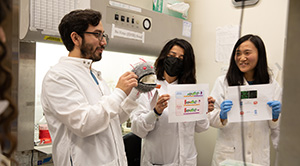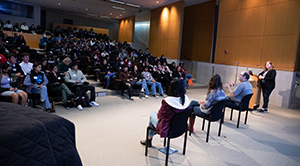Diversifying STEM
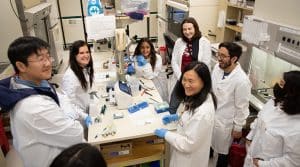
K-12 STEM Education
For over 40 years, Salk Education Outreach has delivered innovative, engaging STEM learning experiences to thousands of students at no cost to students, teachers, or schools. Through active outreach and engagement with under-resourced communities, Salk Education Outreach programs inspire and launch the next generation of scientists by improving scientific literacy and understanding of STEM among K-12 students.
Salk Education Outreach’s core programs, the Mobile Science Lab, Heithoff-Brody High School Summer Scholars, and March of Dimes High School Science Day provide opportunity for Salk’s world-class scientists, faculty, and staff to engage with diverse students across San Diego County. These core programs are supplemented through additional outreach programs including Edwards-Yeckel SciChats@Salk and the Ellen Potter Research Connections for Teachers symposium.
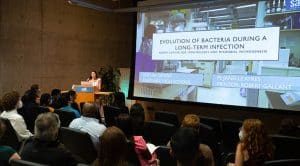
Summer Undergraduate Research Fellowship
The Salk Summer Undergraduate Research Fellowship (Salk SURF) is a 10-week fully paid internship that provides students with exposure to and experience in biomedical research, access to world-class research facilities, and a network of mentors. This program is open to students with limited or no research experience. Applicants must be entering their junior or senior year at the time of participating in the program. Salk SURF aims to build and sustain a diverse STEM pipeline to advance the Salk
Institute’s mission for training the next generation of bold, innovative scientists. It encourages applications from students with backgrounds that are underrepresented in STEM.
Salk EDGE Summer Program
The Salk EDGE is a two-week summer program that aims to Elevate Diversity in Graduate Education by equipping graduate students for competitive careers in academic science. Students are trained on cutting edge techniques while also supporting the use of these new techniques in their home labs through a $1,000 pilot grant to be used in their PhD labs to implement these new technologies. The Salk EDGE is a fully funded competitive program that helps prepare students for Post-Doctoral Fellowship positions in top-tier labs across the country.
Diverse Inclusive Scientific Community Offering a Vision for an Ecosystem Reimagined (DISCOVER)
The inaugural Salk Institute for Biological Sciences Postdoctoral Symposium for a Diverse Inclusive Scientific Community Offering a Vision for an Ecosystem Reimagined (DISCOVER) in academic research is designed to discover diverse talent and build a supportive, collaborative, and inclusive community.
Through the DISCOVER Symposium, future postdocs will have the opportunity to meet faculty mentors who could become future postdoctoral advisors, facilitating new mentor-mentee pairing opportunities and holding space for collaborative/co-mentorship opportunities to form across disciplines of biology, not typically found in traditional postdoctoral interview formats. In this two-day symposium, postdocs will also present their research, participate in discussion groups and professional development workshops, informally chat with Salk faculty, and tour Salk.
Rising Stars Symposium
Every year, Salk brings underrepresented postdoctoral fellows to the Institute for the one-day Rising Star Symposium. Postdocs are typically nominated or self-nominate in years 3-4 of their training, prior to their formal entry into the job market. A selected number of nominated trainees receive the Rising Star Award and an invitation to the Rising Star Symposium where they present their research and meet with faculty one on-one and over dinner. Rising Stars are also paired with a Salk faculty mentor and are maintained informed of relevant Salk recruitment opportunities.
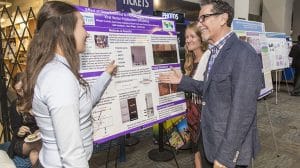
Professional Network Outreach
Salk’s faculty, postdoctoral students, and staff participate in regional and national scientific meetings of underrepresented students and scientists in efforts to diversify the STEM pipeline. By participating in meetings such as the National Diversity in STEM and the Annual Biomedical Research Conference for Minoritized Scientists, Salk aims to increase the visibility of Salk and to open dialogues about Salk as a training opportunity. Salk’s goal is to recruit postdoctoral fellows, graduate students, recent undergraduates who may wish to work for several years before moving on to graduate or medical school, and current undergraduates, including those interested in scientific support roles.
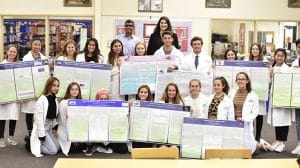
Salk Women & Science
Salk Women & Science engages women in the community with leaders in biological science and technology. The program provides a dynamic and vibrant forum in which community and business leaders gather with Salk’s women of science as friends, entrepreneurs and researchers to discuss the latest discoveries in science and technology while inspiring more women to embrace scientific research as a focus of personal and philanthropic interest.

Mapping the Aging Human Brain
The Salk Institute is leading a $126M effort to map the aging human brain and establish the Center for Multiomic Human Brain Cell Atlas (CMHBCA) as part of the National Institutes of Health’s BRAIN Initiative. As part of this grant, the Center has three main goals to diversify STEM. First, the Center will run a Bioinformatics Training Workshop per year targeting junior faculty, postdocs, and graduate students from backgrounds considered underrepresented in biomedical research (UBR).
Junior faculty who attend the workshop will be able to apply for entry into a mentorship program, which will pair them with an established CMHBCA investigator. Second, the Center aims to provide research opportunities for up to 10 UBR undergraduate students per year. These opportunities will be hosted at Salk University and UC San Diego, Washington University, and University of California Irvine. Third, the Center aims to include biological samples from UBR populations in its study by performing single-cell analysis of 100 brain regions from 50 UBR human subjects.
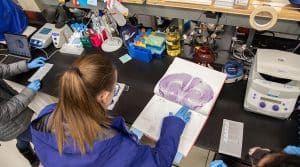
Salk Cancer Center Initiatives
The Salk Cancer Center, named in 1973 as an NCI-Designated Basic Laboratory Cancer Center, strives to move research discoveries from the basic science laboratory into preclinical studies and advanced stages of development to help in the prevention, diagnosis, and treatment of human disease. The Salk Cancer Center leadership has plans under development for increasing the diversity of Salk faculty and our STEM workforce. Salk Cancer Center faculty participate in K-12 education outreach initiatives, the Salk Summer Undergraduate Research Fellowship and Heithoff-Brody High School Summer Scholars programs, and other DEI programming. The cancer center also has a commitment to developing its own DEI initiatives, including but not limited to faculty mentorship, targeted outreach to underrepresented postdoctoral students, and partnerships with minority serving institutions.
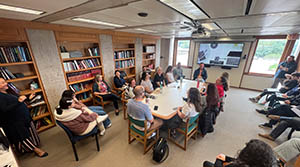
National Academies of Science, Engineering & Medicine Action Collaborative on the Prevention of Sexual Harassment in Higher Education
Salk is proud to be a member of this limited-entity collaborative, which “brings together leaders from over 60 academic and research institutions and key stakeholders to work toward targeted, collective action on addressing and preventing sexual harassment across all disciplines and among all people in higher education. The Action Collaborative creates an active space where colleges, universities, and other research and training institutions will identify, research, develop, and implement efforts that move beyond basic legal compliance to evidence-based policies and practices for addressing and preventing all forms of sexual harassment and promoting a campus climate of civility and respect.”
“I see every human being as having a purpose, a destiny, if you like. And what my hope is that we can find some way to fulfill the biological potential, if you like, the destiny that exists in each of us. And find ways and means to provide such opportunities for everyone.”
-Jonas Salk


